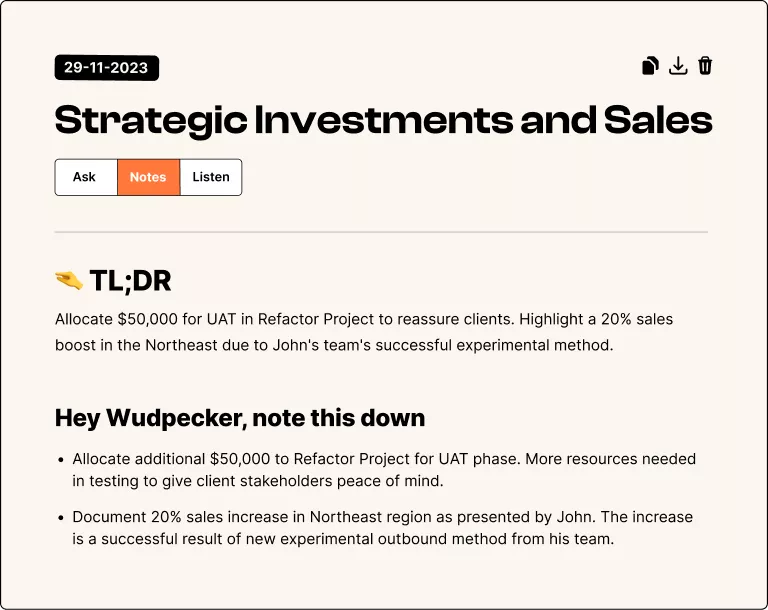Want to learn the best business insights from remarkable speakers at Slush 2023, but don’t have the time to watch the full speeches on YouTube?
You’ve come to the right place. Below is a summary of a speech by Ray Zhou, Co-Founder & CEO of Affinity.
(psst: the notes were automatically generated with Wudpecker's AI notetaking tool. If you'd like to check these notes + transcript + audio recording without needing to log in, press here.)
prompt
<p class="h1-rich">🤏 TL;DR</p>
Affinity is a relationship management software company for deal makers in venture capital and private equity that solves the problem of broken existing tools for managing relationships. The speaker emphasizes the importance of product market fit and shares Affinity's journey to achieving it, including spending time with early customers and measuring product market fit explicitly. Action items include conducting market research, developing personalized success criteria for customers, and implementing a robust product analytics tool.
<p class="h1-rich">✨ Summary</p>
Introduction and Background
- The speaker introduces themselves as Ray, the co-founder and Co-CEO of Affinity.
- They provide a brief background about their family moving to Silicon Valley and their upbringing in a family of scientists.
- The speaker explains that Affinity is a relationship management software company for deal makers in venture capital and private equity.
The Problem Affinity Solves
- Affinity's fundamental belief is that relationships are the most valuable asset for every firm, but existing tools for managing relationships are broken.
- The first problem Affinity identified is that current tools rely on human data entry, which is time-consuming and often inaccurate.
- The second problem is the lack of truthful data about relationships, leading to guesswork and memory-based decision-making.
Finding Product Market Fit
- The speaker defines product market fit as delivering a product that the market wants with clear proof or evidence.
- They emphasize the importance of not mistaking the desire for product market fit with actually achieving it.
- Product market fit is crucial in guiding the prioritization of actions and resources as a founder.
Subtopic: Scientific Approach to Startups
- The speaker draws parallels between startups and science, highlighting the shared goal of seeking the truth.
- They explain that building a startup is an ongoing scientific journey of proving or disproving hypotheses.
- Startups require rigorous experimentation and adaptation based on market feedback.
The Story of Affinity's Journey to Product Market Fit
- Affinity's founders were initially outsiders to the industries they ended up building for.
- Through conversations with investors and professionals in the financial industry, they discovered the pain points of relationship management software.
- They became obsessed with understanding the problems and potential solutions, leading them to tap into data from emails, calendars, and networks.
- Their core technology became the foundation of Affinity CRM, focusing initially on private capital investors.
Subtopic: Spending Time with Early Customers
- Affinity spent an inordinate amount of time with early customers, working closely with them and iterating based on their feedback.
- They aimed to develop true empathy with users and understand the minutiae of their psychology and needs.
- The speaker emphasizes the importance of intentionally overkilling in making early customers successful.
Subtopic: Measuring Product Market Fit
- Affinity developed personalized success criteria and metrics for each pilot customer, both quantitative and qualitative.
- They also tracked product usage metrics and monitored them maniacally using tools like Amplitude.
- The speaker advises measuring product market fit explicitly and setting ambitious goals based on the nature of the business.
Conclusion
- The speaker highlights that product market fit is just the first checkpoint in the startup journey.
- They urge founders to stay focused on what really matters and avoid getting distracted by other aspects of the business.
- The speaker recaps the five lessons: prioritize what truly matters, treat product market fit as a hypothesis, obsess over the market problem, spend time with early customers, and measure product market fit explicitly.



.svg)



.jpg)
















.svg)
